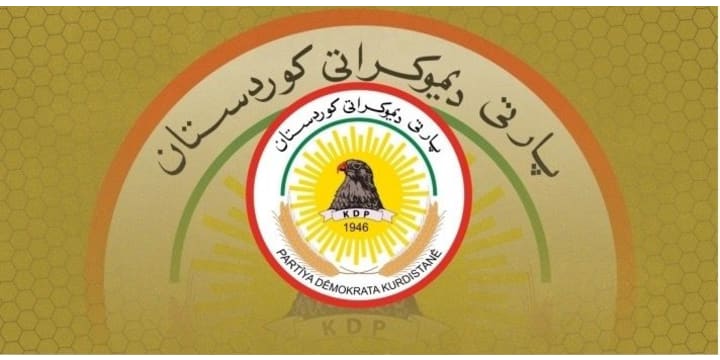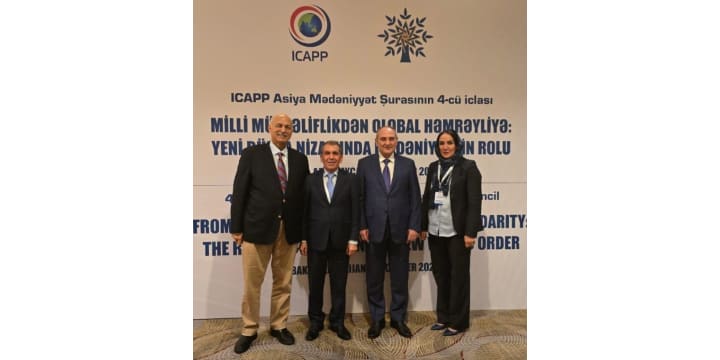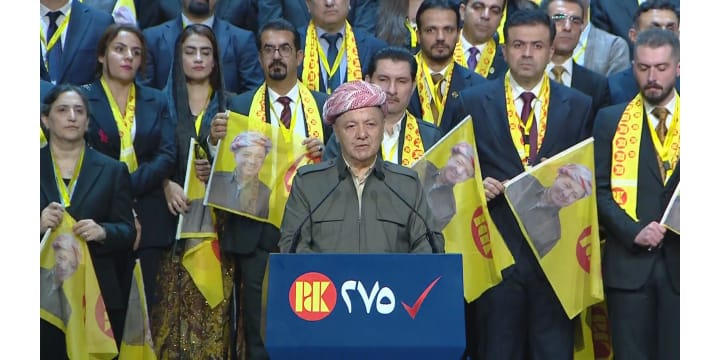
The Kurdistan Democratic Party bloc responds to the "encroachment of the so-called Central and Southern Representatives Assembly on the rights of the people of Kurdistan"
The Kurdistan Democratic Party (KDP) bloc in the Iraqi parliament issued a response on Saturday, January 25, 2025, to “the so-called Central and Southern Representatives’ Assembly’s encroachment on the rights of the people of Kurdistan.”
Below is the text of the response:
Under the guise of representing the people of the center and south, a group of representatives who claim to represent our people in the center and south, issued a statement that includes a blatant targeting of the Kurdistan Region and its people, and threatens to cut salaries and citizens’ food, in complete contradiction with the miserable reality suffered by the central and southern provinces, where citizens lack the most basic elements of a decent life, including services, roads, and hospitals. While only about 6.5% of the federal budget is sent to the Kurdistan Region, the question remains: Where is the remaining 93.5% of the budget spent in the central and southern regions? This refutes the claims of this group that it represents the people of these regions. In the last elections, only 20% participated, and this group only received 4% of the voters’ votes. How can you claim to represent the center and the south? You came to power thanks to the withdrawal of some representatives, and even 10% of the people of your provinces did not vote for you. In what capacity do you speak on behalf of Iraq? This group should have demanded the rights of the marginalized people of the center and the south who groan under the burden of poverty and deprivation, instead of targeting the region and its citizens.
While you consider Kurdistan not to be part of Iraq, you do not keep your hands off it and will not reach its level of development and progress. And because you are afraid of living in the rest of the regions of Iraq, you move your homes to Kurdistan. Envy and jealousy have blinded your insight and prevented you from seeing the clear truth.
The Kurdistan Region is a federal region according to the constitution, and you have no right to interfere in its internal affairs, and we will not allow you to.
Your belonging to a class characterized by hatred and abhorrent chauvinism does not give you the right to represent all the Iraqi people, and you are not representatives of the people of the center and the south, as there are strong historical relations between the people of Kurdistan and our people in the center and the south, and these falsehoods and slanders do not fool them.
If your concern was Kurdistan, why do you object and oppose compensating the victims of Anfal who were martyred by a mentality similar to yours?
You will not be satisfied with the success of Kurdistan because of the rampant envy and jealousy in your souls.
You claim to represent your regions that constitute 94% of Iraq's revenues, but the country is still in its worst conditions.
Do you realize why?
Because we do not follow your path in making decisions. And because of your looting, corruption, aggression, and hatred of different nationalities, religions, and sects, you will never succeed.
Beware of the consequences of these hostile positions, because your fate is inevitably failure.
Accordingly, the following must be clarified:
First: Regarding salaries and revenues
Regarding the obligations of the Kurdistan Regional Government, Article (12) of the Federal Budget Law stipulates, after the issuance of Federal Supreme Court Decision No. (212/Federal/2022), that the salaries of employees and retirees of the Kurdistan Region be paid without any obstacles. The Federal Court’s decision laid the legal basis for their disbursement away from political disputes and problems, similar to the rest of Iraq. Despite this, the federal government did not send the salaries of the region’s employees for three months in 2023, in addition to the salary for December (12) of 2024.
After initially differing opinions on the percentage of non-oil revenues, an agreement was reached between the Prime Minister of the Federal Council of Ministers and the Prime Minister of the Region last May, under Article (29) of the Financial Management Law No. (6) of 2019. Accordingly, the Kurdistan Region deposited the federal treasury's share of non-oil revenues into the bank account of the Iraqi Ministry of Finance in the Erbil branch of the Central Bank of Iraq, for five consecutive months, the last of which was on (10/16/2024).
However, the Federal Ministry of Finance has significantly reduced funding for monthly salaries since October, allocating only (760,000,000,000) dinars for that month, which forced the Kurdistan Regional Government to use non-oil revenues to cover the salary deficit. In light of the federal government's failure to finance the region's salaries, the regional government was forced to spend 960 billion dinars from its internal revenues to cover the salary deficit.
In May, the KRG expressed its readiness to hand over all non-oil revenues to the federal prime minister, provided that the federal government disburses the Kurdistan Region’s operational and investment budget as voted in the budget law.
With regard to border crossing revenues, we reiterate that all such revenues are clearly stated in the monthly audit balance report of the federal general budget, and have been audited by the joint teams of the regional and federal financial audit bureaus. Due to the federal government's refusal to disburse the financial dues to the region according to the 2023 budget law under the pretext of the actual spending law, the region was forced to obtain three loans to disburse social welfare salaries. It is also worth noting that the federal government has spent on investment projects other than the budget law and outside its framework.
The disbursement of salaries came based on a decision by the Federal Court, despite the existence of allocations in the budget law, but in 2024, about (823,000,000,000) dinars were not disbursed as the Kurdistan Region's share in the paragraphs (employee compensation and social welfare). While in 2024, the federal government spent an amount of (26,800,000,000,000) dinars on investment projects and project advances in the governorates of southern and central Iraq without sending a single dinar to the region.
With regard to internal revenues, we have repeatedly demanded the necessity of clarifying and defining the federal internal revenues, because all laws have granted the right to some of these revenues to the governorates, including the Kurdistan Region. But we are surprised that the federal government, in a federal state whose constitution granted this right to the region, is dealing with the matter according to a central law.
It was your duty to follow up on the amount of non-oil sums and revenues between the Kurdistan Region and the federal government.
The actual state spending in 2024 amounted to 156 trillion dinars, 10 trillion dinars of which were paid to the region, or about 6.5%, while the region’s percentage of the Iraqi population according to the population census exceeds 14%.
Despite the allocation of more than 4.5 trillion dinars to the operational and investment budget, not a single dinar has been spent on the Kurdistan Region so far.
The Kurdistan Region, with three governorates, two airports, and four international border crossings, achieved non-oil revenues in 2024 exceeding (4,300,000,000,000) dinars.
The federal government, with (15) governorates, (4) airports, (21) border crossings, and several water ports, achieved non-oil revenues in 2024 amounting to about (8,500,000,000,000) dinars, which confirms the fact that the rate of corruption in the areas under the control of the federal government is much higher and there is no comparison with the region.
With regard to the border crossings, we clarify that the crossings in the region are established and operate according to laws and instructions, while in the rest of the regions of Iraq there is no such thing as crossings, but rather the borders have become loose and open without controls and to anyone, and a fertile ground for drug trafficking and corruption.
Second: Regarding natural resources
The region did not export oil until after the federal government cut its budget in 2014.
The opening ceremony of the region's oil exports was attended by His Excellency the President of the Republic of Iraq and the President of the Kurdistan Region, which means that the export was not unilateral, but with the knowledge and participation of the federal government.
The oil produced from the region's fields and the quantities produced by the North Oil Company in Kirkuk, affiliated with the federal Ministry of Oil, were exported together via the region's pipeline to the Turkish port of Ceyhan, where the quantity transported from Kirkuk oil alone amounted to more than 141 million barrels without paying a dinar or dollar for that.
The decision to stop exports on 3/25/2023 was not made by the region, but rather came as a result of the lawsuit filed by the federal Ministry of Oil against the Turkish Ministry of Energy, which resulted in the export being stopped.
The suspension of the region's oil exports from (25/3/2023 to 25/1/2025) caused material damage to the financial budget of both the federal government and the regional government, amounting to no less than (22) billion dollars, while it is not expected, at best, that the federal Ministry of Oil will gain from the lawsuit filed against Turkey more than (3.5) billion dollars.
After the suspension of the export process and within one week, several meetings were held between the delegation of the regional government and the federal government, and we reached the signing of a memorandum of agreement in the presence of both prime ministers in the federal government and the region on 4/4/2023 regarding the resumption of exports, and unfortunately the agreement was not implemented by the federal government.
The Ministry of Oil requested that the region's oil be delivered to the refineries that work for their ministry, and out of good faith we did so from 6/25/2023 to 11/30/2023, and we delivered (11,816,280) barrels, but the Ministry of Finance did not pay the dues of the producing and transporting companies for this quantity, and as a result the companies stopped supplying.
The partially produced oil of the region is to cover domestic consumption of gasoline and kerosene, pay the refining fees for the refineries that work for the region, and the fees for purchasing gas from the producing companies, and fuel for the power stations that we supply part of the national electricity networks affiliated with the Federal Ministry of Electricity.
Following the cessation of the export of the region's oil, the Federal Ministry of Oil was supposed to supply the region, like the rest of the regions of Iraq, with petroleum derivatives (gasoline, diesel, kerosene, and fuel for power stations) at the prices in effect in the rest of Iraq. However, this did not happen, which forced the region to resort to production to cover its daily domestic consumption needs, noting that the federal Ministry of Oil refines no less than one million barrels per day without equipping the region.
Regarding the issue of the selling price of a barrel of crude oil sold locally in the region and comparing it to the selling price through SOMO internationally, there is certainly a difference in price, since the sale resulted from the region’s need to consume oil derivatives that do not match global prices, and the region did not express any objection to SOMO taking over the sale of the region's oil, provided that the dues of these companies are paid to the regional government in order to pay the dues of the oil-producing companies in return.
The contracts of the oil companies in the region were concluded in accordance with the legal contexts in force internationally, and therefore the sale of oil at any price must be with the consent of both parties (the companies, as well as a specialized committee for this purpose in the ministry), and not a decision taken by one party.
Regarding the application of Article 12, secondly (a) in the case of exporting the region’s oil, and this depends on the federal side, we are ready to export provided that the dues of the oil companies are secured. Regarding the subject of Article (12) Secondly (b) in the event of non-exportation, i.e., to domestic refineries, this is what we did and delivered (11,816,280) barrels, and the Ministry of Finance did not pay the dues for this quantity to the regional government, and as a result the companies refused to supply.
The Federal Council of Ministers approved amending this article on 11/5/2024, and the first reading of the draft amendment took place in the House of Representatives on 11/26/2024, and the second reading on 1/13/2025, then the article was presented for a vote on 1/21/2025. Unfortunately, it was not voted on, and the region is not to blame for that.
Kurdistan Democratic Party BlocIraqi Council of RepresentativesJanuary 25, 2025

